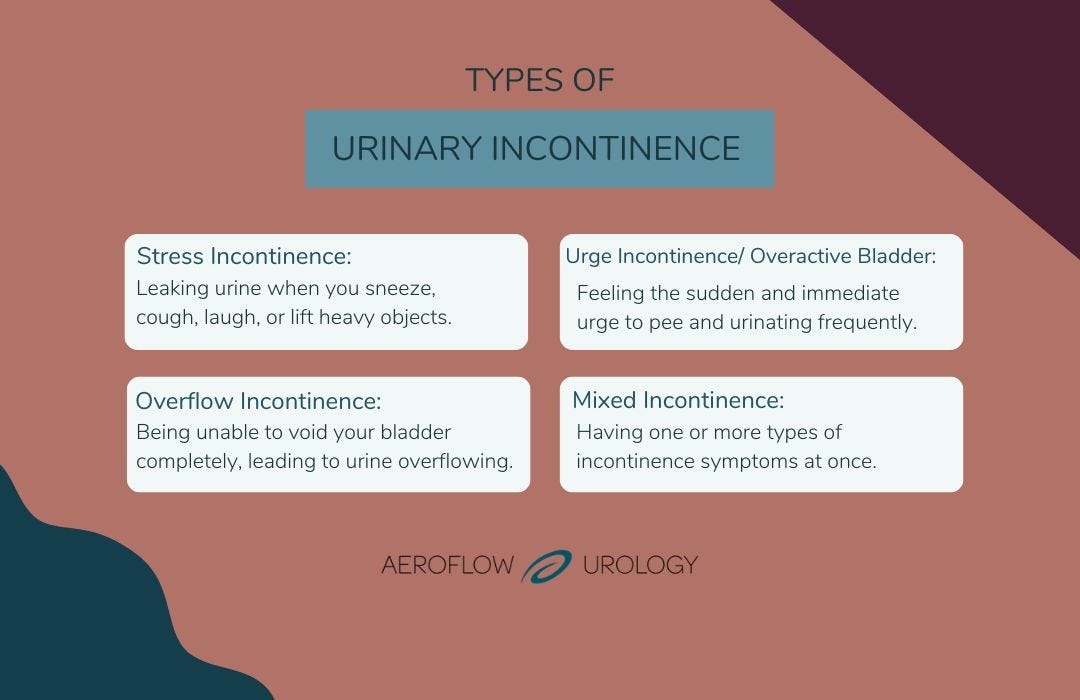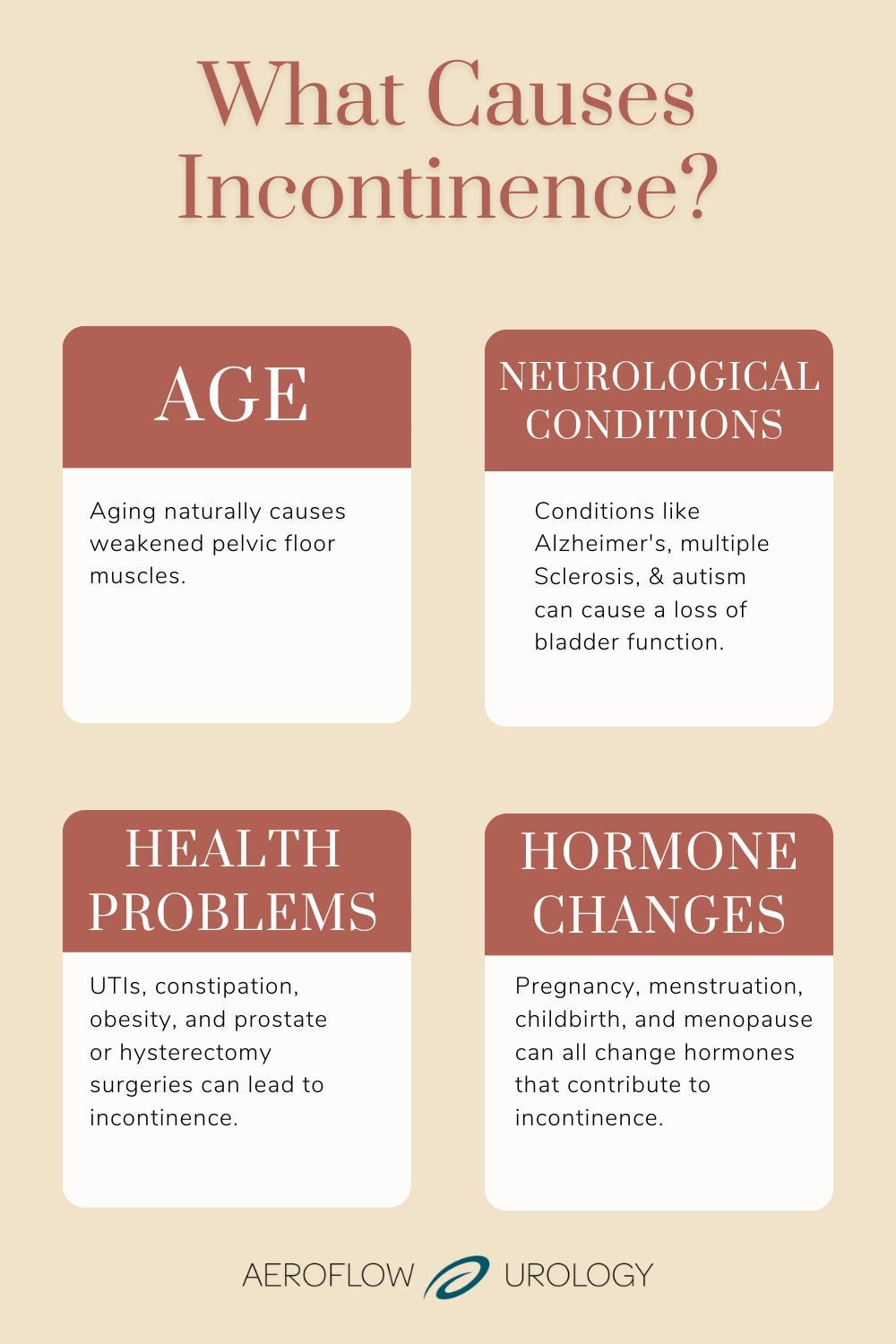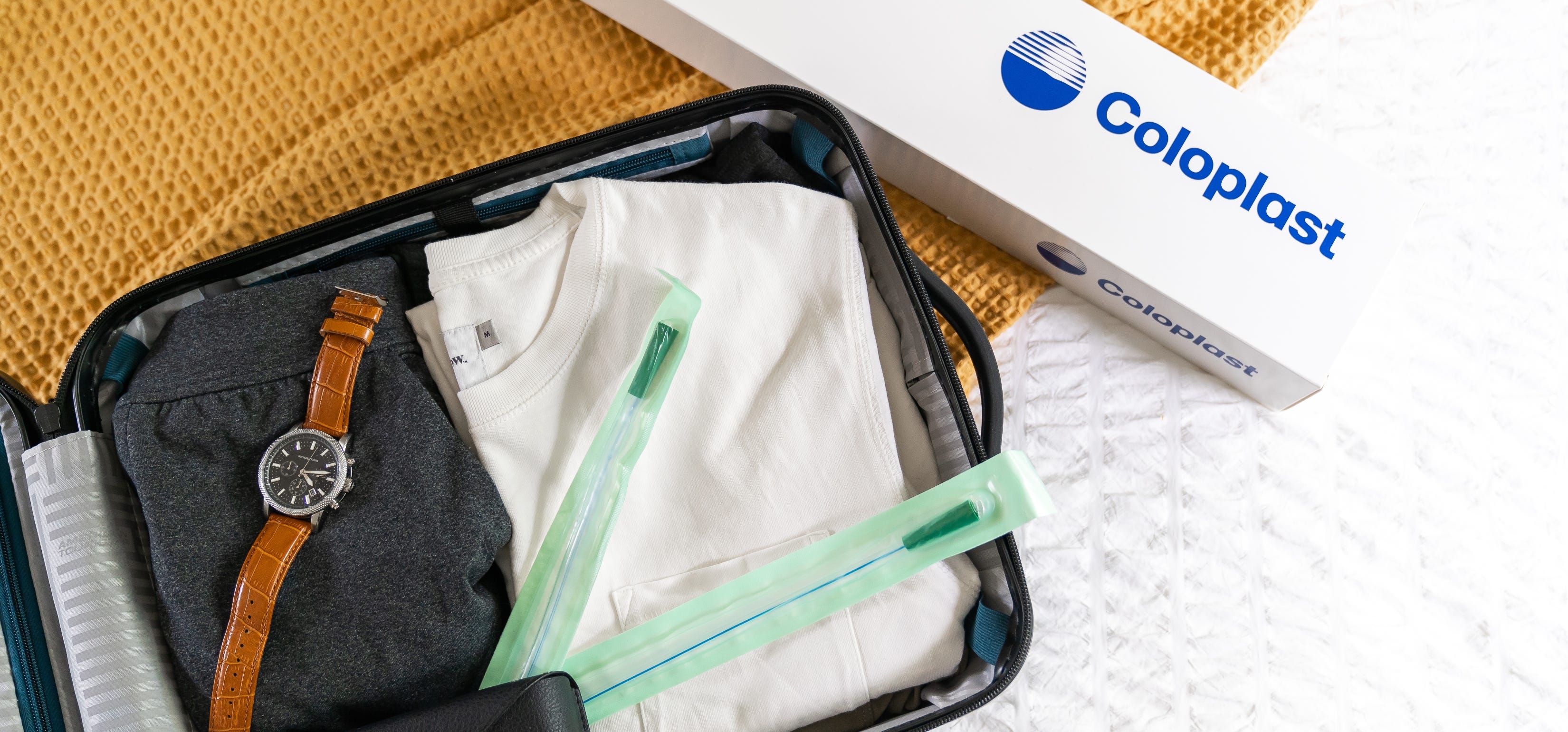Over 25 million people in North America experience urinary incontinence, but what causes it?
Here we’ll explain what urinary incontinence is, what causes it, and how to manage it.
What Is Urinary Incontinence?
Urinary incontinence is a loss of bladder control that leads to urine leakage or urine dribbling.
Incontinence currently effects:
- 50-84% of the elderly in long-term care facilities live with it.
- Over 25 million adults in the US experience incontinence.
- Approximately 1 in 10 children in the US.
There are different types of urinary incontinence, including:
Overactive bladder: Feeling the urge to void your bladder often and peeing frequently.
Stress incontinence: Stress urinary incontinence is when sneezing, coughing, laughing, or lifting heavy objects leads to urine leaks.
Urge incontinence: Feeling the sudden and immediate urge to pee.
Overflow incontinence: Unable to void your bladder completely, leading to a loss of urine.
Mixed Incontinence: Having one or more types of incontinence symptoms at once.
Check Your Eligibility
2 Easy Steps
From catheters to pediatric and adult incontinence supplies, discover the continence care essentials covered by your insurance.
So, What Causes Urinary Incontinence?
Many health-related factors contribute to urinary incontinence, such as age and medical history. However, knowing what causes this issue is the first step in treating it.
Age
Incontinence is much more common among older adults and the elderly. As you get older, your body changes, and along with those changes, your bladder and pelvic floor muscles also change.
Bladder muscles change over time, decreasing the bladder’s capacity to hold urine. Therefore, it is inevitable that the older you get, the more likely you are to become incontinent.
If you suffer from age-related urinary incontinence, call your healthcare professional to discuss what solutions are available.


Neurological Conditions
Your body revolves around nerves that send signals to your bladder. However, those signals get blocked if you suffer a stroke or a traumatic brain injury.
When neurological disorders interfere with nerve signals involved in bladder control, urinary incontinence occurs.
Some neurological disorders that can cause incontinence are:
- Dementia. Dementia, like Alzheimer’s disease, causes a person to experience incontinence issues. Because someone with dementia may not realize they need to go to the bathroom, urinary incontinence occurs.
- Multiple sclerosis (MS). People with MS may lose the ability to control their bladder due to loss of muscle coordination.
- Spinal cord injury. If you have a spinal cord injury, you may no longer be able to properly use the bathroom or feel when you need to go due to nerve damage.
- Attention-deficit hyperactivity disorder (ADHD). Sometimes people with ADHD cannot feel that they need to go to the bathroom or pay attention to their bodies' signals.
- Autism. There are multiple reasons people who have autism may become incontinent, including not being able to feel their bodily signals, being afraid of the bathroom, and developmental delays.
- Parkinson’s disease. Parkinson’s disease can cause a frequency of urinary dysfunction and incontinence due to a disruption in the brain and the bladder signals.
- Spinal cord injury. If you have a spinal cord injury, you may no longer be able to properly use the bathroom or feel when you need to go due to nerve damage.
- Attention-deficit hyperactivity disorder (ADHD). Sometimes people with ADHD cannot feel that they need to go to the bathroom or pay attention to their bodies' signals.
- Autism. There are multiple reasons people who have autism may become incontinent, including not being able to feel their bodily signals, being afraid of the bathroom, and developmental delays.
- Parkinson’s disease. Parkinson’s disease can cause a frequency of urinary dysfunction and incontinence due to a disruption in the brain and the bladder signals.
Hormone Changes
Urinary incontinence in women can occur during pregnancy, menopause, and even your period when the hormones in your body fluctuate.
Extra pressure is placed on your bladder muscles during pregnancy and childbirth, weakening them and causing damage. Your baby’s head also pushes on your bladder, causing frequent urination and more urges to urinate. In addition, childbirth can stretch the female body, especially if forceps are used.
When a woman goes through menopause, less estrogen production causes deterioration in the lining of the bladder and urethra. Urinary incontinence occurs when these tissues are damaged, such as light bladder leakage.
Health Problems
From prostate issues to bladder infections, health problems can cause incontinence.
Common causes include:
- Urinary tract infections (UTIs): Sometime,s something as minor as a urinary tract infection can irritate your bladder and lead to incontinence issues such as light bladder leakage. Because your bladder is irritated, you may have a strong urge to “go” and not control the flow.


- Constipation: Many people do not understand that constipation causes urinary incontinence. Because the rectum sits near the bladder and shares some of the same nerves, hard, compacted stools increase the probability of incontinence.
- Obesity: Some people who are obese may experience incontinence due to extra pressure from the bodyweight being put on the bladder, damaging it and the pelvic floor muscles.
- Prostate problems: The prostate is a walnut-sized gland that sits between the penis and bladder. When men usually develop issues with their prostates glands, such as an enlarged prostate or prostate cancer, urinary problems occur.
- Hysterectomy: Women who have hysterectomies are prone to urinary incontinence due to hormonal changes and muscle and ligament damage.
- Obstruction: Any obstruction, such as a kidney stone that blocks the normal flow of urine through the urinary tract, can cause incontinence.
How to Treat Urinary Incontinence
The causes of incontinence vary from a simple bladder infection to more severe issues. Your urinary system health should a high priority since so many things can change your continence level. There are many treatment options available for the side effects of incontinence that allow you to regain your quality of life.
A few treatment options include:
- Pelvic floor exercises (kegel exercises).
- Urinary system tests, such as urodynamic testing.
- Regular physical activity to manage weight and overall health.
- Nerve stimulation procedures.
- Lifestyle changes, such as diet improvement.
- Incontinence products usage or catheter usage.
- Vaginal pessaries.
- Bladder training.
- Surgeries.
Get Incontinence Products for Free
Regardless of the cause, always consult your healthcare provider before self-treatment.
Aeroflow Urology may be able to help you have your urinary incontinence supplies covered by insurance.
To see if your insurance covers the cost, complete the Qualify Through Insurance form, and a representative will do all the paperwork for you!
Incontinence in Men: Treatment and Management. (n.d.). WebMD.https://www.webmd.com/urinary-incontinence-oab/ss/slideshow-male-incontinence#:~:text=Urinary%20Incontinence%20Is%20Common%20and%20Treatable&text=About%203.4%20million%20men%20in
Daytime Wetting (Urinary Incontinence) in Children. (n.d.). Cleveland Clinic. https://my.clevelandclinic.org/health/diseases/17910-daytime-wetting-urinary-incontinence-in-children-
Urinary Incontinence in Women. (2021, August 8). Www.hopkinsmedicine.org. https://www.hopkinsmedicine.org/health/conditions-and-diseases/urinary-incontinence/urinary-incontinence-in-women#:~:text=Urinary%20Incontinence%20in%20Women%3A%20What%20You%20Need%20to%20Know&text=Over%2025%20million%20adult%20Americans
Information provided on the Aeroflow Urology website is not intended as a substitute for medical advice or care from a healthcare professional. Aeroflow recommends consulting your healthcare provider if you are experiencing medical issues relating to incontinence.







